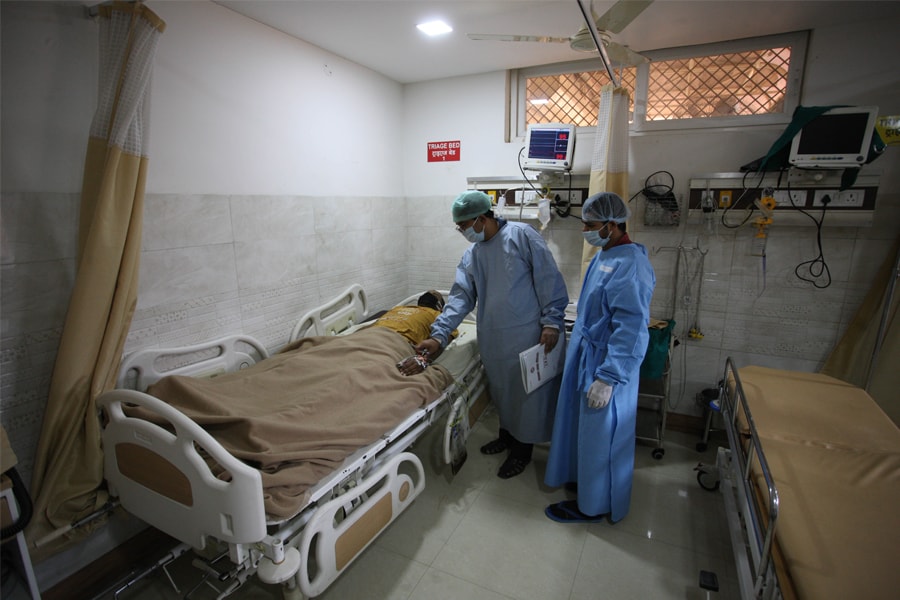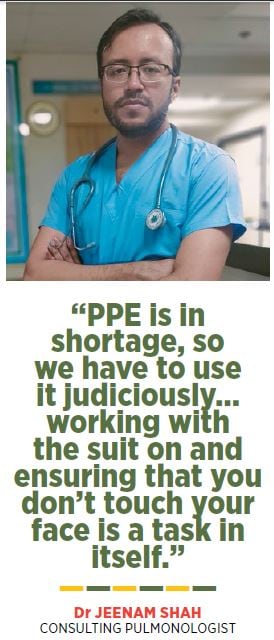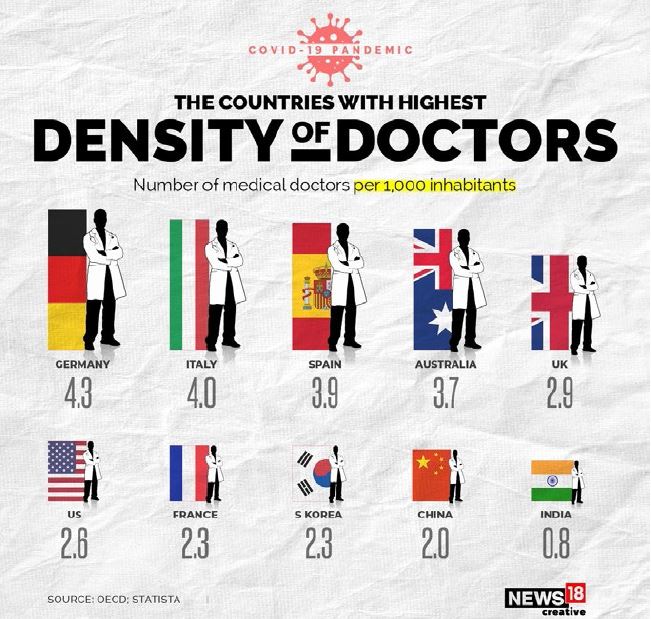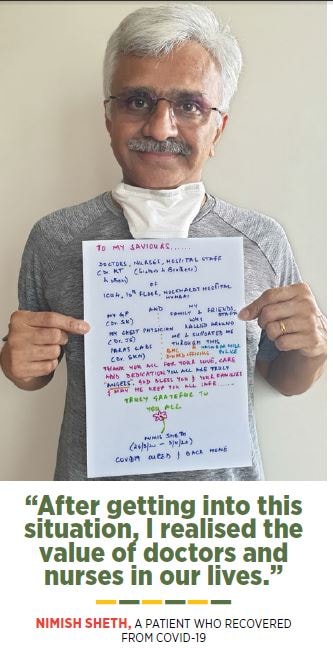
Warriors on the frontline
How doctors and nurses in hospitals along with assorted health activists and workers on the outside are taking on the Covid-19 crisis head-on and saving lives against all odds
 Doctors and nurses are pulling out all stops to treat Covid-19 patients, but some have been abused by neighbours
Doctors and nurses are pulling out all stops to treat Covid-19 patients, but some have been abused by neighboursImage: Ritesh Shukla / NurPhoto via Getty Images
After her shift ends at 6 pm at KJ Somaiya Hospital in Sion, Mumbai, Mini enters her two-room home on the fifth floor of a seven-storey building in Kharghar, on the outskirts of Mumbai, some 30 km from the hospital, with tentative and cautious steps. As she ensures that she doesn’t touch anything, her 15-year-old daughter watches from a distance; her mother has told her that they cannot hug each other for some days.
The 48-year-old nursing superintendent has set new rules in the house; she lives alone in a separate room and her routine has also changed. She doesn’t touch anything once she walks through the building gate; her husband is there to help, pressing the lift button to take her home. Mini straightaway heads for a shower and sanitises everything she carries from outside —her uniform, cap and scarf.
“Initially it was difficult for us to cope with this new lifestyle, but we don’t have any other option. Not hugging my daughter after returning from work was hard to digest,” shrugs Mini, whose responsibilities at work include delegating nurses to Covid-19 patients and making sure that the 90 nurses in her team are taking all the precautions as suggested.
KJ Somaiya is one of the many hospitals doubling up as isolation and quarantine centres for Covid-19 patients. At the time of writing, the hospital had over 20 patients who tested positive; one died because of coronavirus. Mini and her team have been at it for 15 days now. “Wearing personal protective equipment (PPE) and a mask for long hours is not easy. Plus it is getting hotter by the day. My team comes crying to me with dribbles of sweat trickling down their faces. I see the exhaustion and pain in their eyes. But we don’t have an option. I keep giving them rotational shifts so that they’re not overloaded with work.”
Mini has her own moments of despair, something that she has learnt to hide when she performs her duties. “The entire team approaches me when they face any trouble; if I start crying in front of them, where will they go? On one particular day I was so stressed that I couldn’t understand what to do... I called up my mom and cried my heart out,” she says. That happened during the initial days of the pandemic when Covid-19 patients were new to the hospital staff. “I have overcome all of it now and am getting stronger each day,” she adds.
As the number of deaths, new cases and those testing positive for Covid-19 burgeon by the day in Mumbai, hospitals are buckling under the virus assault. In mid-April, Mumbai Mirror reported that at least 15 hospitals, including Saifee, Wockhardt and Bhatia in Mumbai, had shut down after health staff contracted the virus.

Dr Jeenam Shah, a consultant pulmonologist who would practice at these three city hospitals, describes the tribulations of those at the frontline. “PPE is in shortage, so we have to use it judiciously. Working with the suit on and ensuring that you don’t touch your face is a task in itself,” he says. What’s more, health workers point out that it becomes uncomfortable to move one’s face in the head mask that they have to wear. Those wearing spectacles have a bigger challenge when the glasses get foggy. “And, after wearing PPE, one cannot go to the washroom or eat; if you have to use the washroom, you have to discard everything,” adds Shah.
As the novel coronavirus ploughs its destructive path, doctors and nurses leading the battle are not adequately armed and remain vulnerable. From Mumbai to Delhi, Indore, Chennai and Kolkata, among other cities, more and more frontline workers—an estimated 150 health workers at the time of writing—had tested positive. Mumbai is perhaps the worst off, with an estimated 100 health workers getting infected. Apart from shortages of PPE, hospitals are being held responsible for alleged negligence in immediately isolating staff who carried the virus and went on to spread it. Another reason more health workers got exposed to the virus is that people hid their travel or contact history.
THE AGONY…
Dr Shrikanth Srinivasan, head of department, critical care medicine, Manipal Hospital, Delhi, explains the doctor-patient dilemma: “The problematic part of this disease is that it has such varied presentations that one has to be always alert to make sure that they are dealing with all patients with similar flu-like illness with a high suspicion.” That, however, may not be easy as those being treated may have their own apprehensions, tempting them to not reveal their complete history and hide parts of it. “So during times like these, we have to make sure that we don’t miss out on taking any precautions,” adds Srinivasan, who was also at the forefront when swine flu broke out in April 2009 in India.
According to the Centre for Disease Dynamics, Economics & Policy, India has a shortage of about 6 lakh doctors and around 20 lakh nurses; the scarcity in supporting medical staff will be correspondingly larger. That means losing even a single doctor or nurse due to lack of protective equipment or not following the standard operating procedure in handling Covid-19 cases is reason for alarm for the community as a whole. After all, don’t forget that countries like the US, Spain, Italy, China and France, which have superior doctor-patient ratios, have failed to cope with the spread of Covid-19. As many as 27,000 health care workers tested positive for coronavirus in Spain while the figure was 9,000 in the US.

While doctors and nurses are dealing with the lack of PPE, many Accredited Social Health Activist (Asha) workers who are also on the frontline of the Covid-19 battle don’t have access to masks and gloves. Between her door-to-door visits, 40-year-old Urmila Patil asks people if they have experienced any symptoms linked to Covid-19 or if they have guests from another state or country. Patil was asked to conduct this health survey in Islampur, a small town in Sangli district of Maharashtra. The town had already reported over two dozen Covid-19 cases when Asha workers were told to conduct the survey. “Due to the unavailability of masks, I wrapped a stole around my face while conducting these surveys. I knew this was risky, but didn’t have any other option. The sarpanch (village head) warned me not to step out of the house. My family also didn’t support me enough. But I fought with everyone and did what I had to do,” says Patil. The state government has instructed these Asha workers to check for symptoms and advised on precautions to deal with Covid-19.
…AND THE ECSTACY
It was a proud moment for 32-year-old Ligin James, Covid-unit in charge at Global Hospital, Mumbai, after the hospital managed to cure the very first patient of coronavirus who didn’t have a travel history. After testing positive, the patient plunged into depression as the infection was completely unexpected; he was worried about his wife and children. “We continued with his treatment and he tested negative after 10 days... when we informed him that he will be discharged, the expression of joy on his face is something that I will never forget in my lifetime. It was a fantastic moment for us. He sent a big thank you message. All of us were feeling so good because he was our first patient with this virus and we cured him. This was a motivating factor to save more such lives,” says James. He pauses for a moment and continues, “At times I get frustrated because wearing the PPE equipment for seven hours on the trot and staying inside the ICU is difficult. Once we wear the suit, we cannot even use the washroom. But we take it positively and keep working because it is for our safety.”
Doctors, nurses and health care workers are not the only ones fighting the battle against coronavirus. Other key workers who often go unnoticed like the police, security guards, pilots, railway staff, utility workers and garbage collectors continue to work to ensure there’s little disruption during the lockdown.
Experts say the country’s health care system is not prepared to cope with a massive outbreak. After all, around 130 million people will head to hospitals even if 10 percent of India’s population is infected. According to the Organisation for Economic Co-operation and Development, India has only 0.5 hospital beds per 1,000 people, one of the lowest ratios in the world. Containing the outbreak with a nationwide lockdown and social distancing will play a major role in flattening the curve. Cases in India have drastically shot up in recent days and these workers are on the ground to ensure people follow the rules so that they can be safe and sound.

Nimis Sheth, 57, who recently recovered from Covid-19 couldn’t stop praising the health workers who treated him at Wockhardt Hospital in Mumbai. Sheth tested positive in March-end after returning from the US. “The doctors and nurses are our real heroes during this time. My family and I were going through a tough time, but these health workers made sure that our mental health is sound and stable, and gave proper counselling. It was my birthday while I was being treated and the medical staff got me a cupcake to make me feel special. These are small things, but they really matter... after getting into this situation I realised the value of doctors and nurses in our lives.”
However, despite their noble deeds, several health care workers are dealing with social ostracism and harassment. Dr Sanjivani Panigrahi is one of those to have been at the receiving end. She works at Surat Civil Hospital where coronavirus patients are being treated, but is not deployed in the Covid-19 ward. The 34-year-old doctor was recently physically attacked and verbally abused by her neighbours in front of her three-year-old son. “My neighbours thought I have coronavirus just because I go to hospital every day. They asked me to stop going to the hospital and warned that they will bar my entry in the building otherwise. After constant mental torture from my neighbourhood, I tweeted the entire incident, tagging all government officials. Thanks to social media, our local BJP MLA connected with me and immediately sent the police for help,” she says. Panigrahi posted a video of her neighbours attacking her while she was leaving her house; after the video went viral, the Surat police took strict action and detained the neighbours.
Panigrahi’s ordeal hopefully may not be the norm. Dr Prashant Borade, critical care consultant at Mumbai's Global Hospital, has been treating Covid-19 patients for a month now. “I go home every day and take complete precautions so that my family and people in the surroundings are safe. I’m not facing any issues in my neighbourhood. In fact my neighbours and others in the society seek advice from me about the precautions the society should take to be safe from this virus. It's all about communicating and making people understand what the virus is all about, and what precautions we (doctors) are taking. This makes things easier,” he says.
Borade adds that today, the country is a battlefield and the only warriors are the health workers. “People have started giving us more respect for what we are doing and that gives us the motivation and energy to carry on,” he says. Will that persist once the pandemic blows over?
Dr Om Shrivastava, infectious diseases specialist at Jaslok Hospital, suggests that people need to become more responsible once the pandemic subsides. “This is not the first epidemic that we are seeing, and it is not going to be the last. I think our way of life will have to change from now on... we cannot continue with the kind of lifestyle that we were following. I think it's also important for the policymakers and decision makers in any country to prepare the infrastructure to combat this kind of a situation because all outcomes will depend on what the public health infrastructure is in that country,” he says.
Shrivastava uses a war metaphor to describe the level of readiness required. “The more you sweat in peace, the less you bleed in war. It is important to be prepared.”








